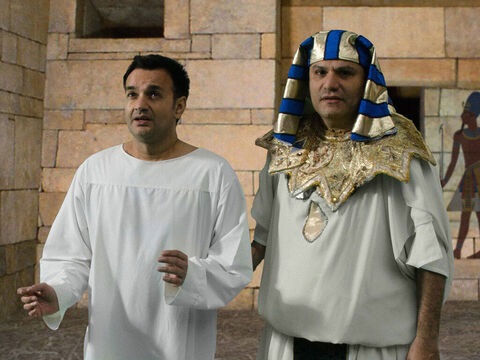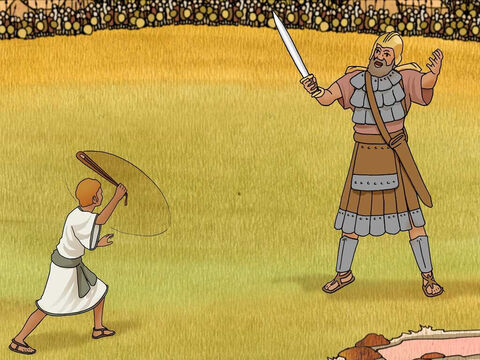[Picture: Joseph and Pharaoh... freebibleimages]
[For articles on the “Sabbath of Miketz" in Hebrew, click here]
Updated on December 20, 2022Rabbi Dr. Yossi Feintuch was born in Afula and holds a Ph.D. in American history from Emory University in Atlanta. He taught American history at Ben-Gurion University.
Author of the book US Policy on Jerusalem.
He is the rabbi of Congregation Shalom Bayit in Bend, Oregon.
* * *
Even as the Pharaoh was fully aware that Joseph, who deciphered for him his dual dream that none of Egypt’s necromancers was brave enough to interpret, was a mere youth, a Hebrew, and an inmate in the royal penitentiary, who was a slave before he was placed there, the Pharaoh quickly detected Joseph’s distinct qualities. Joseph, who did not hesitate to tell the Pharaoh that Egypt was going to experience an acute famine after a cycle of bountiful seven years, took no credit for his ability to construe the Pharaoh’s dream, even as he attributed it all to ‘’that is beyond me; it is God who will respond with Pharaoh’s welfare’’ (Genesis 41:16). Further, Joseph did not only resolve the Pharaoh's mysterious dream – for that is why he was brought from the slammer before the Pharaoh -- but he went on to suggest to the Pharaoh what to do. Without being asked he advised the king to appoint ‘’a discerning and wise man and set him over the land of Egypt’’ (v. 33) to prepare it for the eventual famine.
[Picture: Joseph and Pharaoh... freebibleimages]
Despite the various reasons in Joseph’s grotesque ‘’resume’’ that would sway another monarch from considering Joseph for such a top position, the Pharaoh announced to Joseph: ‘’You shall be in charge of my palace and by your command shall all my people be sustained; only by my throne shall I outrank you’’(v. 40). With this decision the Pharaoh became the harbinger of all future anti-discrimination laws wherever they would be enacted. Clearly, the Pharaoh ignored Joseph's potential whammies, whether on account of age, ethnicity, class, or criminal record and focused solely on his being uniquely ‘’wise and discerning’’ (v.39) to perform well on the job.
We see the same idea playing twice in Moses’ pattern of decision-making. First, when he met at Sinai with Jethro, his Midianite father-in-law, and a pagan priest. Jethro criticized and admonished Moses for the way he administered legal justice. Jethro volunteered his own ideas for improving the system; Moses could have promptly dismissed them. Who is Jethro, he might have asked himself, to reproach me for my way in administering this legal system? I, who is on good speaking terms with God, could hear from God Himself about such flaws and how to fix them. I certainly do not need a pagan priest to advise me about judging. Yet, Moses recognized wisdom and discernment when he met them, even in Jethro's poignant criticism and suggestions for improvement.
[Picture: Joseph and Jethro... Bible Paintings / Painter: Ahuva Klein (c) Oil on canvas]
Even as the Pharaoh chose Joseph for his viceroy on the basis of merit alone, rather than on nationalistic grounds that would not have served well the good of Egypt, so does Moses in later years when he first wanted his sons to succeed him at the helm. But according to the Midrash God rejected this idea saying to him: "Your sons sat around and did not engage in Torah.’’ Joshua by contrast "served and honored you greatly… with all his might; it is right that he will serve Israel and not forfeit his deserving reward’’ to your undeserving sons (B'midbar Rabbah 21:14). Indeed, though God told Moses to lay his hand on Joshua and ordain him as his successor, Moses, in fact, laid both hands on Joshua to demonstrate his whole-hearted embrace of his successor despite his initial natural wish for his sons to succeed him. Laying both hands on Joshua symbolized Moses’ realization that God chose ‘’right’’; not only did he not argue with God, as he did on other matters before, but he embraced meritocracy over nepotism with both hands; the right man for the job; politics aside!
Indeed, when a father wants his children to succeed him, or at the least to secure for them lucrative jobs that they mismatch, we end up with the travesty of Samuel, a honorable national judge in Israel who appointed his two sons to follow him even as judges in Beersheba. For Samuel either ignored or chose not to see red flags that must have been evident before he did so. Both sons, Joel and Aviyah ‘’did not follow his ways, turned after profit, took bribes and subverted the law’’ (1 S 8:3).
[Picture: Joseph and Pharaoh... freebibleimages]
King Saul, agreeing to send the young David to meet the Philistine giant Goliath in a duel, is reminiscent of the Pharaoh whose magicians would not interpret his dreams. Similarly, none of King Saul's warriors dared to challenge Goliath in a one-on-one match. Only David, a youth, who was not a trained warrior convinced King Saul that he had what it took to take on Goliath. Like Joseph, who had no experience in managing a home front economy, David was too young to enlist in King Saul’s professional army. And yet, King Saul realized after speaking with David, that he was the only person who might have a chance to triumph over Goliath, even as the stakes were very high; David’s demise would entail national enslavement under the Philistines. King Saul trusted David, not unlike the Pharaoh who trusted Joseph, who like David was an unconventional choice, to say the least, for the challenge ahead.
[Picture: David and Goliath... freebibleimages]
All in all, beginning with the Pharaoh in this weekly Torah portion, Miketz, we see how good and effective leaders appoint the right people to serve national causes in a way that is divorced from any partisan or prejudiced considerations. The Pharaoh is a trailblazer in setting this exemplary pattern of governance.
[For articles on the “Sabbath of Miketz" in Hebrew, click here]

![[Picture: Joseph and Pharaoh... freebibleimages]](https://www.xn--7dbl2a.com/wp-content/uploads/2021/12/יוסף-ופרעה.jpg)


![[Picture: Joseph and Jethro... Bible Paintings / Painter: Ahuva Klein (c) Oil on canvas]](https://www.xn--7dbl2a.com/wp-content/uploads/2019/01/ציורי-תנך-יתרו-מכיר-בגדולת-ה-ציירה-אהובה-קליין.jpg)




